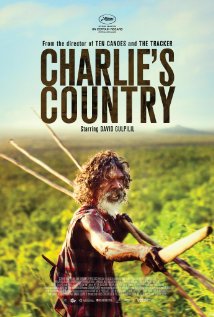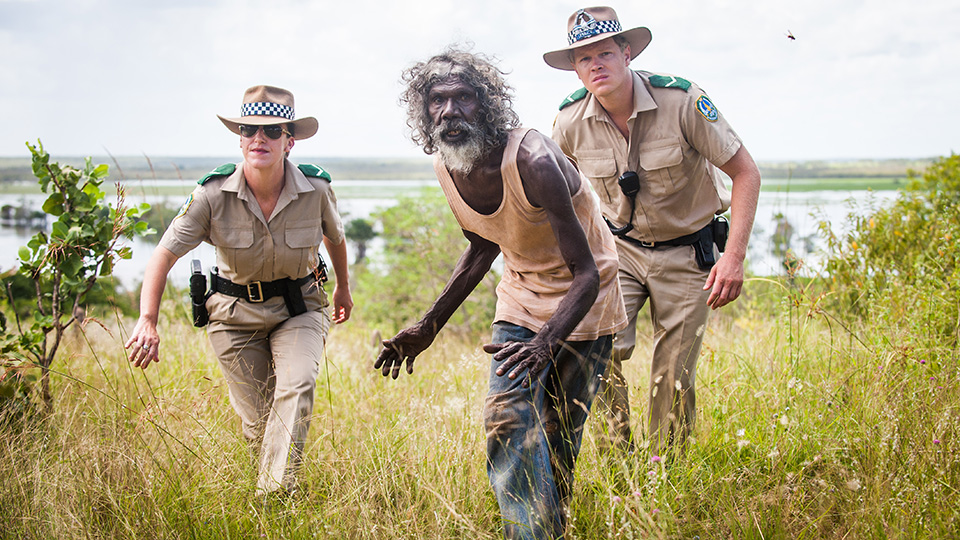TIFF: Charlie's Country
 Friday, September 5, 2014 at 11:12AM
Friday, September 5, 2014 at 11:12AM Nathaniel's Adventures at TIFF. Day 1
There's nothing like the fresh smell of na movies in the morning. Or the coffee while watching the movies. I love starting the day with a movie. Always have. It's easy to do that at TIFF where things start rolling at 8:30 AM. So I popped out of bed and hit the theater. At my second movie at 11 AM, two filmmakers in the seats next to me joked that the fairly robust attendance on the first morning of press & industry screenings was because late night boozing hadn't begun yet. "Not so," I interjected, having been to a pre-TIFF party the night before and spotting some familiar faces. "I know for a fact that someone here has a hangover." They laughed and I realized, too late, that it probably sounded like a confession. T'was not, I swear! I left that pre-TIFF party sober and l-o-n-g before I hear it wound down.

CHARLIE'S COUNTRY [Australia]
Time has been good to aboriginal actor David Gulipil's face. His first starring role was in Walkabout way back in 1971, but four decades later when you see him on screen in historical films like Ten Canoes (2006) or epics like Australia (2008) his shock of tangled grey and white hair and those visible years on his skin have granted his memorable face even more big screen potency. It's a great face to spend time with and the Dutch-Australian director Rolf de Heer knows it, often just leaving the camera on him for long stretches when not much is actually happening. His latest collaboration with Gulpilil (they co-wrote the film) is a character drama about an old man named Charlie who longs for the "old ways" and resents white Australia and all the policies of "The Intervention".
I know absolutely nothing about Australian politics that I didn't learn from the movies. No two ethnically and morally fraught political situations are exactly comparable -- I don't mean to be reductive -- but what we see in Charlie's Country (and every politically or historically minded Australian film before it), reminded me so strongly of America's own often shameful history and treatment of Native Americans that it was easy to be quickly engrossed without actually understanding details. Much of Charlie's struggles and personal setbacks are a complicated result of a mixture of that politically stacked deck, hopeless self-sabotage, and his respect for "the old ways" that feels both completely genuine and goosed up for whenever he wants feel righteously offended. Charlie longs to track and hunt but isn't allowed to have weapons, he hates fast food but that's all his community has easy access too. The film's best moments are when Charlie's natural sense of humor and feisty spirit busts through the sad political reality: Charlie pretending to be a better tracker than he is; the joy of cooking in nature's "supermarket"; Charlie's friendly antagonistic relationship with both the local cops (they greet each other with "white bastard / black bastard" bickering) and his own community.

I'd like to heartily recommend Charlie's Country but the truth is it aggravated me as often as it moved me. The pacing is strangely glacial and some of its most superb moments are ruined by goosing them too far. Take for instance a tough scene in a hospital where a doctor asks Charlie if he can just call him that because "foreign names are hard for me to pronounce." If you're paying any attention at all the moment arrives like a cold hard slap. It's enough to enrage you on Charlie's behalf but he underlines it himself with a muttered "so now I'm a foreigner?" He rubs the sting away with his own vocalized indignation, no longer requiring yours. Worse yet is the repetitive (if thankfully sparse) musical score that sounds exactly like a Clint Eastwood parody. Eastwood shouldn't even score his own movies, let alone other people's! There's a wonderful moment late in the film in which Charlie remembers a dance performance from his youth and you hear, all too briefy, the thrilling indigenous didgeridoo. Why not use that for scoring since the movie's heart, like Charlie's, longs for the old country. B-/C+
Also at TIFF: A Little Chaos, Wild, The Gate, Cub, The Farewell Party, Behavior, The Theory of Everything, Imitation Game, Foxcatcher, Song of the Sea, 1001 Grams, Labyrinth of Lies, Sand Dollars, The Last Five Years, Wild Tales, A Pigeon Sat on a Branch Reflecting on Existence, Force Majeure, Life in a Fishbowl, Out of Nature, The Kingdom of Dreams and Madness, and Mommy


